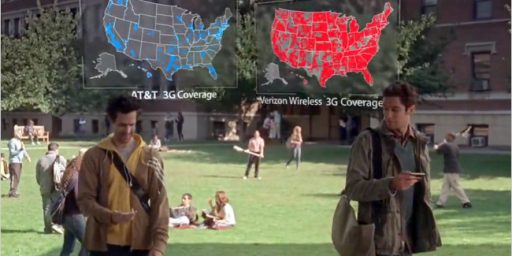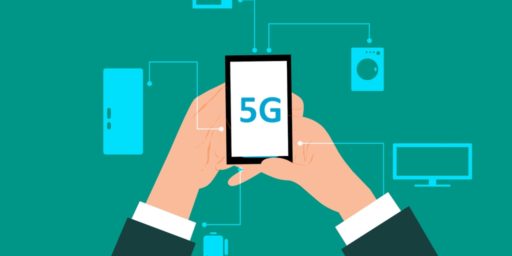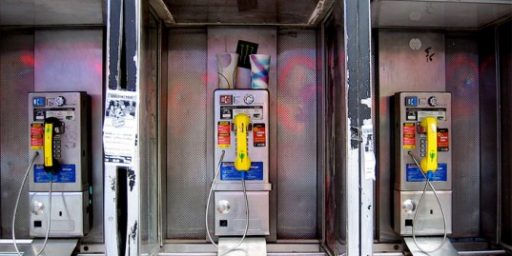WiFi Speeds About to Triple (Does Not Apply to US Government)
Massively faster wireless internet service should be available in early 2015.
Massively faster wireless internet service should be available in early 2015.
CNN Money (“Wi-Fi speeds are about to triple“):
Qualcomm announced plans this week for new technology that it says could triple Wi-Fi speeds in homes, offices and on public networks.
At the moment, Wi-Fi networks can only serve one device at a time, cycling quickly among different users. That creates slower speeds for everyone when more devices connect to the network.
“On a network like this, streaming or video chatting can be like sitting in the driver’s seat at rush hour: you’ll get to your destination, but it’s going to take some time,” Qualcomm said.
The company’s new approach, which follows seven years of research, allows networks to transmit data to multiple groups of users simultaneously using algorithms that adapt on the fly to changes in usage. The technology is known as “MU-MIMO,” which stands for “multi-user, multiple input, multiple output.”
Qualcomm plans to sell MU-MIMO-enabled chips to manufacturers of wireless routers and access points, as well as to companies that make smartphones, tablets and other consumer electronics.
[…]
“Using MU-MIMO is like using the carpool lane: the Wi-Fi Highway doesn’t change, but grouping up with other users lets you go much faster while de-congesting the other lanes,” the company said.
Qualcomm plans to start demonstrating the technology within the next few months before beginning shipments to customers early next year.
Given how much of our lives are on the Internet these days, this is a welcome development, indeed. Naturally, of course, those of us who work in government offices shouldn’t expect to see this technology before 2020 at the earliest.







With a family of five and multiple devices per person connected to the home network, I welcome this development with open arms.
I have Comcast and pay them extra for 50 mbps instead of 20. My desk top computer is hardwired and I usually gets closer to 60 mbps. I both stream movies and use my laptop on home wifi in the living room about 30 feet from my modem. I have no problem both streaming movies and using my laptop at the same time. A speed test shows that my laptop gets about 17 mbps in the living room over the wifi. I also have my 2 Kindles and a tablet on the home wifi although I rarely if ever both stream movies and use the Kindle at the same time.
@Ron Beasley:
If you have only one device accessing, and actively using the wifi network at a time (I’m assuming you aren’t using your laptop, two kindles, and a tablet at the same time), you’re not going to notice any degradation. You likely won’t notice much of a difference when these new chips enter the market, either.
Typically, the bottleneck isn’t the WiFi. But for cases like Taylor’s, it probably will have a noticeable impact. For cases like Beasley and myself (at least until our family gets bigger) we’re mostly waiting on faster broadband.
Or we could easily improve all our wifi speeds if we did what Europe does and determined that the internet is a national priority and shouldn’t be subjects to the whims of three or four gigantic corporations. But of course corporate apololgists, thieves and “libertarians” in this country have announced that allowing a quasi-monopoly among a handful of multinationals based on exclusive contracts with local governments is a triumph of the free market, so we can’t hope for real improvement.
How they reconcile “freedom” with state governments passing laws to keep municipalities from offering fast, free service to their citizens is a little tough to understand unless you remember that freedom only belongs to those who can buy it from politicians.
At least, James, you have wifi in your govt office. Some of us (for usually security reasons) have to leave our cell phones and devices in the car or check them in at the door.
@Scott: Sure. I work at a university, though, and deal entirely in the unclassified world (although I am required to maintain a security clearance). We have to bring our own laptops and/or tablets to get around the horrendously bad government-provided technology, which randomly blocks like 2/3 of the web.
Maybe someday we will catch up with South Korea. Hope springs eternal.
I think it’s important to realize that the internet is part of the infrastructure. If not socialized it at least should be regulated on the state level like electricity and phone service. Federal law at this time makes that illegal. This needs to change but won’t as long as the rethuglicans have any power.
Whenever I hear talk of speeds beyond “high-speed Internet,” I’m always reminded of the following:
http://www.youtube.com/watch?v=mk7VWcuVOf0
@Kylopod: I tend to be reminded of this:
https://www.youtube.com/watch?v=0ilMx7k7mso
@wr: Note that this is referring to Wifi speeds, not home Internet service speeds. Europe has the WiFi technology that we use in the US.
IT’ll never be 3x faster even in optimal conditions. If you’re in a populated area with a good number of wireless users you will probably see a minor improvement.
I’m lucky in that I have only a couple other wireless devices in my area so I can get 8 megabyte transfer speeds over the 802.11n basically anywhere in my small house. DD-WRT also helps some with my wireless performance.
I am lucky in that I have an extremely good broadband cable provider. They are expanding but they are tiny compared to comcast or any other big name. Grande Communications is my provider and they have +99% uptime here.
Its quite impressive how fast WiFi is improving. Our wireless network partners have already started to make extraordinary advancements in providing faster and higher quality wireless networks.